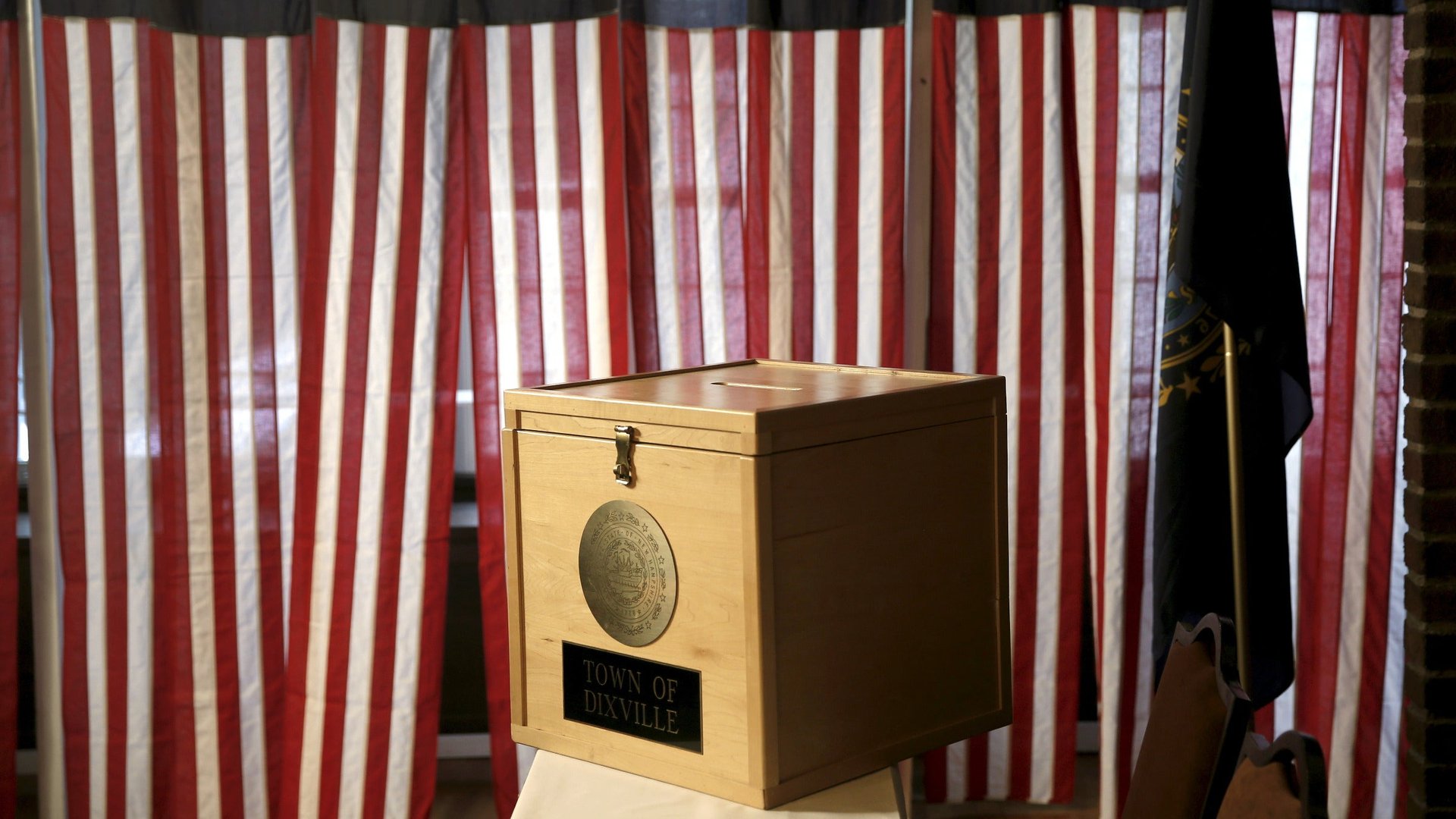Today is the New Hampshire primary—but what’s the point?
Gripes about New Hampshire’s first-in-the-nation presidential primary are nothing new, but this year’s version raises a new question, beyond the debate about the state’s outsize influence: does retail politics even matter anymore in a presidential primary?


Gripes about New Hampshire’s first-in-the-nation presidential primary are nothing new, but this year’s version raises a new question, beyond the debate about the state’s outsize influence: does retail politics even matter anymore in a presidential primary?
Every four years, the political and chattering classes return to one of the smallest states in the US to watch presidential candidates subject themselves to citizen interrogators in gymnasium town halls and glad-hand voters in diners. Along with its cousin, the Iowa caucuses, the New Hampshire primary is one of the few times presidential candidates can be observed before they enter an impenetrable campaign bubble as the election sweeps across the country.
But all this effort to reach voters may be for naught if it doesn’t affect the outcome of the nominating race—and it’s simply not clear that it does anymore.
Political scientists at the University of New Hampshire say that the vast majority of the state’s voters don’t even meet the candidates and instead rely on the media, mailers, and their friends to gain information about voting. In both parties, the candidates with the most local endorsements are trailing. And few pundits expect either New Hampshire’s primary to be decisive, or even winnow out many of the contenders.
In the Republican race, the leader in the polls is Donald Trump, who has largely eschewed contact with the hoi polloi, preferring to speak to large rallies and let the media spread his message. His opponents have fought back the old fashioned way, particularly Ohio governor John Kasich, who has made 186 campaign stops in New Hampshire, and former Florida Governor Jeb Bush, who has made 111, according to local broadcaster NECN.
Bush and Kasich may be seeing dividends from their efforts—one Sunday survey (pdf) put Bush and Kasich in second and third place behind Trump and ahead of Texas senator Ted Cruz, whose brand of evangelical politics doesn’t have as receptive an audience here. But the more significant factor may not be the state-wide scramble of the two governors, but the fall of Florida senator Marco Rubio in a televised debate performance that seemed to open up the path to the nomination for other establishment candidates.
Regardless of the finish, at least four and perhaps five GOP candidates will leave New Hampshire with their presidential hopes intact.
Among Democrats, the leading candidate in the polls, Vermont senator Bernie Sanders, has spent slightly more time in New Hampshire, with 93 campaign stops compared to 85 by former Secretary of State Hillary Clinton. But in the last month of the campaign, when most voters are making up their minds, the two candidates have largely eschewed questions at town halls in favor of rallies to fire up their true believers and get them to the polls.
Though nearly every major Democrat in the state has endorsed Clinton, Sanders has held a lead in NH since the end of the summer. That can be attributed to his long familiarity with the state’s voters; New Hampshire Democratic party chairman Raymond Buckley told Quartz that Sanders could always be counted on to show up for party fundraising dinners. But as big a factor is an influx of young voters and Massachusetts migrants that has made the Democratic electorate here more appreciative of the Sanders brand of progressive politics.
It’s interesting to compare Clinton’s response to this challenge with her husband’s problems with rivals in the state during his 1992 presidential run. Then, his strategists saw a turning point in a feisty town hall speech and hours spent shaking hands in the malls, which allowed him to exceed expectations and claim victory despite a second-place finish.
This year, Hillary’s Clinton’s campaign jetted off to Flint, Michigan two days before the primary, to call attention to the disastrous handling of the water supply there—as well as Clinton’s own brand of problem-solving. While she, too, hopes that her New Hampshire campaign will exceed expectations and allow her to claim momentum, her team is settling in for a long battle over delegates in larger, more diverse states they believe will be more favorable to her candidacy.
Even in 2008, when Clinton surprised then-Senator Barack Obama with a win in New Hampshire, the victory came readymade with a literal sob story about a voter who sought to know Clinton as a human. Of course, Clinton didn’t go on to win the nomination.
One thing you can rely on New Hampshire voters for is to surprise. Perhaps the most important numbers coming from University of New Hampshire public opinion surveys of likely voters conducted over the weekend showed they are still making up their minds: Among Democrats, 16% are still deciding and 23% leaning toward a candidate, while for Republicans, it’s 31% still deciding and 24% leaning toward a candidate.
All that means we may be in for a fun day of flinty surprises—including, perhaps, that the race for the White House hasn’t grown too big for pressing the flesh.